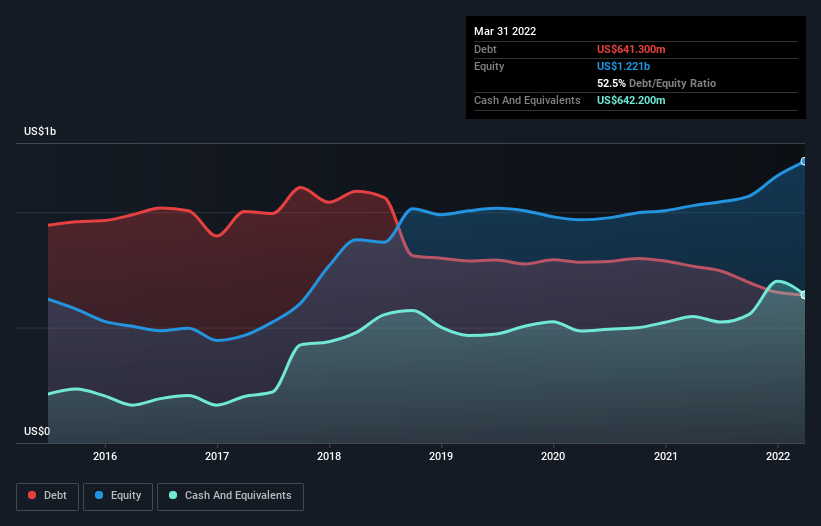
Warren Buffett famously said, 'Volatility is far from synonymous with risk.' It's only natural to consider a company's balance sheet when you examine how risky it is, since debt is often involved when a business collapses. Importantly, Valhi, Inc. (NYSE:VHI) does carry debt. But is this debt a concern to shareholders?
Why Does Debt Bring Risk?
Generally speaking, debt only becomes a real problem when a company can't easily pay it off, either by raising capital or with its own cash flow. Part and parcel of capitalism is the process of 'creative destruction' where failed businesses are mercilessly liquidated by their bankers. However, a more common (but still painful) scenario is that it has to raise new equity capital at a low price, thus permanently diluting shareholders. Of course, debt can be an important tool in businesses, particularly capital heavy businesses. When we examine debt levels, we first consider both cash and debt levels, together.
View our latest analysis for Valhi
What Is Valhi's Debt?
You can click the graphic below for the historical numbers, but it shows that Valhi had US$641.3m of debt in March 2022, down from US$765.5m, one year before. But on the other hand it also has US$642.2m in cash, leading to a US$900.0k net cash position.

How Healthy Is Valhi's Balance Sheet?
We can see from the most recent balance sheet that Valhi had liabilities of US$451.0m falling due within a year, and liabilities of US$1.35b due beyond that. On the other hand, it had cash of US$642.2m and US$443.3m worth of receivables due within a year. So its liabilities total US$716.8m more than the combination of its cash and short-term receivables.
This deficit is considerable relative to its market capitalization of US$1.06b, so it does suggest shareholders should keep an eye on Valhi's use of debt. This suggests shareholders would be heavily diluted if the company needed to shore up its balance sheet in a hurry. Despite its noteworthy liabilities, Valhi boasts net cash, so it's fair to say it does not have a heavy debt load!
Better yet, Valhi grew its EBIT by 146% last year, which is an impressive improvement. If maintained that growth will make the debt even more manageable in the years ahead. The balance sheet is clearly the area to focus on when you are analysing debt. But you can't view debt in total isolation; since Valhi will need earnings to service that debt. So when considering debt, it's definitely worth looking at the earnings trend. Click here for an interactive snapshot.
Finally, while the tax-man may adore accounting profits, lenders only accept cold hard cash. Valhi may have net cash on the balance sheet, but it is still interesting to look at how well the business converts its earnings before interest and tax (EBIT) to free cash flow, because that will influence both its need for, and its capacity to manage debt. During the last three years, Valhi generated free cash flow amounting to a very robust 100% of its EBIT, more than we'd expect. That positions it well to pay down debt if desirable to do so.
Summing up
While Valhi does have more liabilities than liquid assets, it also has net cash of US$900.0k. And it impressed us with free cash flow of US$312m, being 100% of its EBIT. So we don't think Valhi's use of debt is risky. There's no doubt that we learn most about debt from the balance sheet. However, not all investment risk resides within the balance sheet - far from it. For instance, we've identified 2 warning signs for Valhi (1 shouldn't be ignored) you should be aware of.
If, after all that, you're more interested in a fast growing company with a rock-solid balance sheet, then check out our list of net cash growth stocks without delay.
New: Manage All Your Stock Portfolios in One Place
We've created the ultimate portfolio companion for stock investors, and it's free.
• Connect an unlimited number of Portfolios and see your total in one currency
• Be alerted to new Warning Signs or Risks via email or mobile
• Track the Fair Value of your stocks
Have feedback on this article? Concerned about the content? Get in touch with us directly. Alternatively, email editorial-team (at) simplywallst.com.
This article by Simply Wall St is general in nature. We provide commentary based on historical data and analyst forecasts only using an unbiased methodology and our articles are not intended to be financial advice. It does not constitute a recommendation to buy or sell any stock, and does not take account of your objectives, or your financial situation. We aim to bring you long-term focused analysis driven by fundamental data. Note that our analysis may not factor in the latest price-sensitive company announcements or qualitative material. Simply Wall St has no position in any stocks mentioned.
About NYSE:VHI
Valhi
Engages in the chemicals, component products, and real estate management and development businesses in Europe, North America, the Asia Pacific, and internationally.
Excellent balance sheet and slightly overvalued.
Market Insights
Community Narratives


